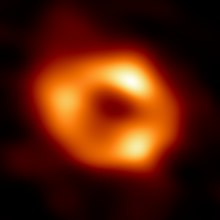User:Ixfd64/Astronomers create first image of supermassive black hole at Milky Way's center
Thursday, May 12, 2022

Astronomers announced Thursday they had taken the first-ever image of the supermassive black hole at the center of the Milky Way galaxy.
The black hole is known as Sagittarius A* (abbreviated Sgr A*) and estimated to be four million times the mass of the Sun. Researchers used very-long-baseline interferometry to combine data from an array of radio telescopes from around the world, resulting in the Event Horizon Telescope (EHT) that acts as an Earth-sized radio telescope. The collaboration started in 2009 with the goal of imaging Sgr A* and the black hole at the center of the galaxy M87.
The team released an image of M87's black hole, located at a distance of about 55 million light-years, in April 2019. Although Sgr A* is much closer to Earth at 26,000 light-years, processing the data took longer due to Sgr A* being smaller than M87 and matter orbiting Sgr A* more quickly. Computer scientist Katie Bouman stated that Sgr A* changes "minute to minute" for this reason. EHT scientist Chi-kwan Chan compared imaging Sgr A* to taking "a clear picture of a puppy quickly chasing its tail."
One of the team's next goals is to study the possible breakdown of general relativity in regions near black holes. Bouman stated that it also expects to determine the nature of the three "knots" in the image. She added that the team hopes to eventually make videos of the black holes as they change over time, but currently lacks the data to do so.
Sources
edit- Seth Fletcher. "The First Picture of the Black Hole at the Milky Way’s Heart Has Been Revealed" — Scientific American, May 12, 2022
- Ashley Strickland. "1st image of supermassive black hole at the center of Milky Way galaxy revealed" — CNN, May 12, 2022
- Leah Crane. "What's next for Event Horizon Telescope after its black hole pictures?" — New Scientist, May 12, 2022
- Jackson Ryan and Monisha Ravisetti. "Astronomers Reveal First 'Groundbreaking' Image of Milky Way's Black Hole" — CNET, May 12, 2022
